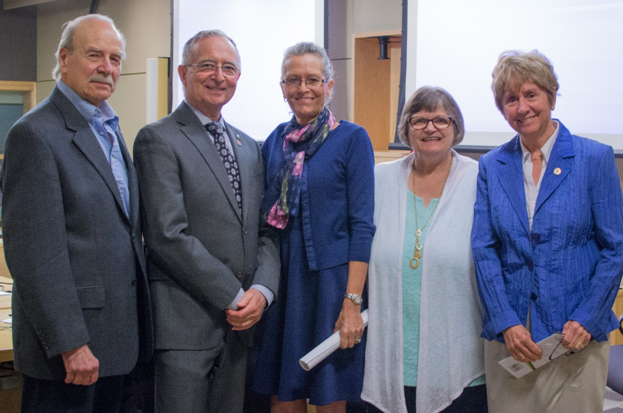
The Ontario Dementia Advisory Group challenges us to think differently about a diagnosis

In February 2016, the Standing Senate Committee on Social Affairs, Science and Technology started investigating the issue of dementia in Canada , with the aim of producing a final report by November 30, 2016. They’ve met with myriad witnesses representing many aspects of the complex network of health agencies, experts and researchers who can lend insights into the state of dementia. Executive directors, doctors, and other professionals helped to guide and inform the course of the study as Witnesses. But on May 18, 2016, the Committee heard testimonies that may be the most valuable yet.
A shift in the study of dementia in Canada
Members of the Ontario Dementia Advisory Group (ODAG)—each one of them living with a dementia diagnosis—stood as Witnesses. For the first time since the study began, the Senate Committee heard from people who are living—and living well—with the disease.
People like Phyllis Fehr, Bill Heibein, Bea Kraayenhof and Mary Beth Wighton are learning to navigate life with a diagnosis with few resources at their disposal.
“We go through these things almost every day. We get frustrated when dementia strategies are started and we’re not even asked to contribute. We should be front and centre at the table doing it with you. That’s what we feel is best.”
– Bea Kraayenhof, Board Member, Ontario Dementia Advisory Group (ODAG)
The impact of an early diagnosis
The most important contribution that ODAG members offer to this conversation is their ability to break through the stigma of dementia. The significance of ODAG’s presence at the Senate is huge: their passionate advocacy, strong community spirit, and lived understanding of the impacts of the disease set a new precedent.
“My story is like most other people living with dementia. It is our desire to live life fully and utilize our remaining skills that help us remain strong. We reject the notion of going home to die. The time between diagnosis and end-stage dementia can be many years. In the meantime, we have the ability to live life well.”
-Mary Beth Wighton, Board Member, Ontario Dementia Advisory Group (ODAG)
Earlier diagnoses and the availability of ways to slow disease progression challenge many of the established stereotypes of a dementia diagnosis. Meanwhile, the systems in place—from medical to social services to public support—are geared toward those at the late stages of the disease’s progression.
While ODAG members Phyllis, Bill, Bea and Mary Beth come from different parts of Ontario, have unique personal histories, and even different diagnoses, they have one thing in common: They each received a diagnosis in the early stages of the disease. An early diagnosis is still one of the best ways to mitigate the impact of the disease.
“We are a group that were checked early, and that’s the key. That’s where you’re going to find change will happen. The earlier we can catch the disease process and put them on meds, even though the meds aren’t a cure, it slows the progress down. That then allots us time to prepare so that we can stay in our homes and do things for ourselves longer than having to go into care homes.”
– Phyllis Fehr, Board Member, Ontario Dementia Advisory Group (ODAG)
What we learn by listening to those living with a diagnosis
Each ODAG member also spoke to elements that the health-care system is currently missing.
For Phyllis, education for practitioners that will empower them to deliver a diagnosis is critical. Mary Beth spoke of dementia care in Canada as a series of health-related silos that lack the ability to provide social support to better manage the total havoc that a diagnosis can wreak in one’s life. Bea spoke about the importance of meaningful occupation for people living with a diagnosis, while Bill—now a full-time farmer—showcases the fact that one can continue to contribute in meaningful ways even with a diagnosis.
“I’d like to say that one of the things I think we can really do is … be seen and heard in public. When I was first diagnosed, the first thing [I wanted to do] was just withdraw and hide. The more we can be seen, the more people who have just been diagnosed and start to pay attention to what’s happening, hopefully they’re going to get the self-confidence back to be able to go out and participate.”
– Bill Heibein, Board Member, Ontario Dementia Advisory Group (ODAG)
The Chair of the Committee, Senator Kelvin Kenneth Ogilvie, adjourned this remarkable meeting with powerful words that reveal the deep impact of this meeting, saying, “The thing that has struck me … is that because we have examined so many aspects, perhaps from a clinical point of view with experts and so on up to this point [….] We have an enormous amount of background information to which you have added the complete experience. You bring it all together — the context, the application and the things that are missing.
“We have heard you loud and clear today. […] I can’t say enough as to how you have clarified it for us. Your examples have illustrated many of the facets that are critical.”